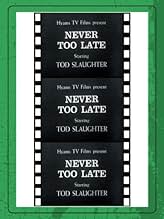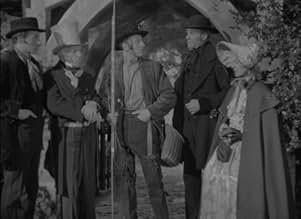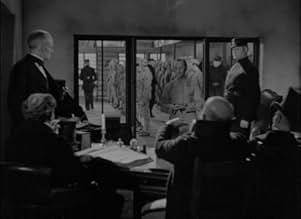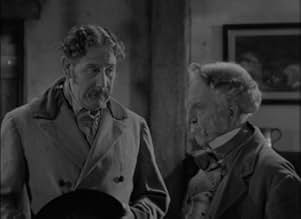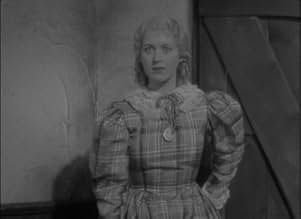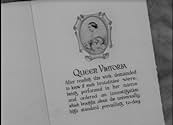Aggiungi una trama nella tua linguaAn evil prison administrator cruelly abuses the inmates at his prison, until one day the tables are turned.An evil prison administrator cruelly abuses the inmates at his prison, until one day the tables are turned.An evil prison administrator cruelly abuses the inmates at his prison, until one day the tables are turned.
- Regia
- Sceneggiatura
- Star
John Singer
- Matthew Josephs
- (as Johnny Singer)
Cecil Bevan
- Prison Inspector
- (non citato nei titoli originali)
Leonard Sharp
- Henry Bradshaw
- (non citato nei titoli originali)
Douglas Stewart
- Prison Inspector
- (non citato nei titoli originali)
Mavis Villiers
- Betty
- (non citato nei titoli originali)
Jack Vyvyan
- Innkeeper
- (non citato nei titoli originali)
Recensioni in evidenza
If you are looking for subtlety, then I suggest you look elsewhere. However, if you don't mind watching an uneven but enjoyably silly film, then "Never Too Late to Mend" is right up your alley! The film's plot is bizarrely entertaining and downright ridiculous at the same time! The film begins about the year 1840. Squire Meadows is intent on marrying Susan—the trouble is that she already loves another, George Fielding. So what is this good Justice of the Peace to do—he'll scheme, steal and even kill to have Susan! And, through most of the film he does just that. It's all VERY florid and silly but entertaining at the same time. Some of the most ludicrous of these scenes are in the prison that the Squire runs—which is like a house of horrors.
The bottom line is that if you want a realistic or well made film, then this is not it. No, it's silly from start to finish but oddly satisfying. Worth seeing just because it's so bad and doesn't even try to be better!
The bottom line is that if you want a realistic or well made film, then this is not it. No, it's silly from start to finish but oddly satisfying. Worth seeing just because it's so bad and doesn't even try to be better!
A bit heavy on the sentimentality, and laying on the sadism pretty thick, Tod Slaughter plays the grotesquely inhumane Justice who treats the prisoners of his local gaol as his "naughty children", taking pleasure in exacerbating their misery and humiliation. His nemesis played by Jack Livesey pledges to return the favour in spades having come in for some rough treatment after taking the rap for his friend (Ian Colin) with whom Slaughter is competing for the affections of the nubile Susan (Taylor).
There's some moments of the depravity and malevolence with which Slaughter's characters are synonymous (the rough justice meted out to poor little Matty Josephs is primed to tug at the heart strings), but director MacDonald has avoided the sexual deviancy that is present in the George King pictures. As a consequence, Slaughter's character is brutal and morally corrupt as always, but not so dastardly that he would burn at the stake for his crimes.
Livesey is pretty good as the knock-about farmer, willing to take a bullet for his friend as a square-up for having once saved his life, and Taylor is suitably torn in her chastity for her poor boyfriend abroad, and the apparent munificence and adulation poured over her family by the scheming Slaughter; her facial expressions whenever Slaughter makes veiled sexual undertones are perhaps exactly what you'd expect when a creepy, corpulent walrus-like aristocrat seeks to charm the brassiere of a virgin some thirty years his junior. Solid 66 minute citizen, but nothing remarkable.
There's some moments of the depravity and malevolence with which Slaughter's characters are synonymous (the rough justice meted out to poor little Matty Josephs is primed to tug at the heart strings), but director MacDonald has avoided the sexual deviancy that is present in the George King pictures. As a consequence, Slaughter's character is brutal and morally corrupt as always, but not so dastardly that he would burn at the stake for his crimes.
Livesey is pretty good as the knock-about farmer, willing to take a bullet for his friend as a square-up for having once saved his life, and Taylor is suitably torn in her chastity for her poor boyfriend abroad, and the apparent munificence and adulation poured over her family by the scheming Slaughter; her facial expressions whenever Slaughter makes veiled sexual undertones are perhaps exactly what you'd expect when a creepy, corpulent walrus-like aristocrat seeks to charm the brassiere of a virgin some thirty years his junior. Solid 66 minute citizen, but nothing remarkable.
This is an underrated portrait of the Victorian prison system and the chaplain who tried to change it. An evil squire(Tod Slaughter) sends an innocent man to the British version of Alcatraz in order to get his filthy mitts on a beautiful girl. The cinematography is what makes this film so memorable. The effective use of light and shadow to accentuate the misery and suffering of the inmates, many of which are victims of a corrupt system, foreshadows a style utilized in many venerable products of English postwar cinema such as David Lean's Oliver Twist(1948) Some modern critics have panned this and many other Tod Slaughter films due to the melodramatic, stagey acting. While films like The Demon Barber of Fleet Street(1936) barely hold up today, Never Too Late is the exception because it is well-acted and photographed and is relevant to the global problem of human rights abuses that in these supposedly progressive times has still to be wiped out. After viewing this, I can see why Queen Victoria passed so many prison reform bills after seeing this story done on stage.
Watching Tod Slaughter in all kinds of venues, I've come to the conclusion that he is about as bad as a person can get. He expresses this great delight with misfortune of others. He uses people for financial gain, yet at the beginnings of most of his movies, he is portrayed as being loved and respected by all. In this one, he plays a squire who is after a young woman (sound familiar) thirty years his junior. He plants traps for her true love. He also oversees a prison, being a justice of the peace. The prisoners, whom he calls his "chilldren," are abused and starved. He gleams with those big teeth over the misfortunes of these people. One boy, in particular, stole a loaf of bread to feed his dying mother (of course), and he is tortured and force to do work beyond his simple strength. Others are kept in a black hole. How despicable can you get? Of course, his comeuppance is on its way. Eventually those he has used will get there's. This guy is so great. Even though he played the same character over and over.
ITS NEVER TO LATE TO MEND is the most traditional of Tod's revived melodramas. It has all the elements and archetypes we expect from the genre. Tod is his usual villainous Squire self. His often comical facial features are better suited to being bewhiskered and having a bushy moustache to twiddle menacingly. As ever, he has his lecherous eye on a virtuous local maiden - Susan, daughter of Farmer Merton. She seeks the penurious local tenant farmer George Fielding (Meadows, Fielding, a slimy solicitor who aid's Tod's schemes called Crawley - the names are not exactly subtle). Tod must be the only wealthy bastard in cinema who never attracts women! But after a failed attempt to convict George for poaching, the young man leaves the country to seek his fortune Down Under. The opening titles reveal Charles Reade's and Queen Victoria's roles in prison reform and it is in the scenes where Tod visits the local gaol in his capacity of Justice of the Peace that we get to enjoy the full magnitude of his hammy villainy. His inspection of the ranks of his "naughty children" and his mocking remarks are a sadistic joy and one can imagine the audience at the Elephant and Castle theatre chuckling along as he speaks. Black comedy is also present in the Uriah Heep-like performance of one convict who makes a great show of demonstrating his penitence but, we see later, has stolen something from the Governor's office. However, the treatment of the 15-year old convict is genuinely disturbing as is John Singer's anguished breakdown.
The tension is diffused by the lack of a strong protagonist for the Squire. George Fielding is sidelined in Australia for the bulk of the narrative - returning only for the climax. The Prison Chaplain provides only token resistance to Tod's reign of terror at the gaol but appears like the 7th cavalry at the end. The main adversary is local poacher Tom Robinson - gallantly taking the blame instead of George for Tod's trumped-up poaching charge. Tom's decline from the jaunty, confident rogue of the opening scenes to a shell of his former self in prison is quite chilling, but the spiritual comfort the Chaplain lends him means a reversion to his old self.
Tom thwarts Meadows' attempts to steal George's newfound fortune. As with MARIA MARTEN, Tod has an alarming tendency to go insane at the inopportune moments - usually while holding his enemies at gunpoint as occurs here at the climax His raving madness as he is led away is genuinely alarming and the closing shot is of him relentlessly repeating the films's title as he works away on the "wheel".
The tension is diffused by the lack of a strong protagonist for the Squire. George Fielding is sidelined in Australia for the bulk of the narrative - returning only for the climax. The Prison Chaplain provides only token resistance to Tod's reign of terror at the gaol but appears like the 7th cavalry at the end. The main adversary is local poacher Tom Robinson - gallantly taking the blame instead of George for Tod's trumped-up poaching charge. Tom's decline from the jaunty, confident rogue of the opening scenes to a shell of his former self in prison is quite chilling, but the spiritual comfort the Chaplain lends him means a reversion to his old self.
Tom thwarts Meadows' attempts to steal George's newfound fortune. As with MARIA MARTEN, Tod has an alarming tendency to go insane at the inopportune moments - usually while holding his enemies at gunpoint as occurs here at the climax His raving madness as he is led away is genuinely alarming and the closing shot is of him relentlessly repeating the films's title as he works away on the "wheel".
Lo sapevi?
- ConnessioniFeatured in La casetta degli orrori (1988)
I più visti
Accedi per valutare e creare un elenco di titoli salvati per ottenere consigli personalizzati
Dettagli
- Tempo di esecuzione
- 1h 10min(70 min)
- Colore
- Proporzioni
- 1.37 : 1
Contribuisci a questa pagina
Suggerisci una modifica o aggiungi i contenuti mancanti

